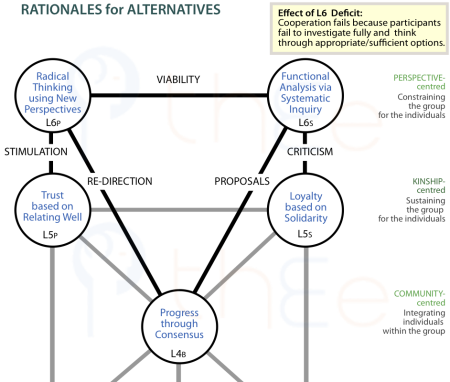New Better Options: L6 Choices
Groups Need New Thinking
Cooperative endeavours can benefit from being thought through more deeply than has been natural at lower Levels. Dispassionate, comprehensive analysis is a feature of thinking
Knowledge is intrinsically consensual, but values force Participant wishes, interests and aspirations into a subsidiary place. The Shared endeavour is what is most important. Cold facts, rigorous logic and perspectives will put limits on what is possible and so constrain communalist choices.
Any disappointments or disruption from thinking things through more clearly must be cushioned by powerful explanations () and by strong relationships ().
Review Perspective-centred Principles from a purely personal perspective.
Tension in Cooperation
Does imply a Participant focus or a Shared-endeavour focus or both? In the , choices related to new thinking appear in two distinct forms.
- Participants focus on their own perspectives and may propose perhaps at variance with the group's view, and sometimes labelled «»: .
- Any Shared endeavour can benefit from . To ensure impartiality, an analysis may be commissioned from an external agency with a known and appropriate perspective:
These two Centres are linked because radical ideas alone are not viable; nor are formal inquiries with results that are not properly understood by all in the group. The linking Channel is therefore labelled Viability ( ↔ ).
- Participants have to be capable of responding to any formal and specialist inquiry; so at least one, preferably more, must properly understand the particular topic and inquiry approach.
- Any radical idea or innovative perspective must be supported by detailed systematic analyses in relation to the Shared endeavour, to clarify their practicality and applicability as well as to convince the group.

Influences in Cooperation

Thinking something new () invariably impinges on group relations and feelings () and on cooperative processes and progress (). However, it has no direct effect on choices related to special competencies (), brute power () or self-interest ().
Limitation
Investigations are expensive and engaging with new ideas is difficult: both can be extremely time-consuming. The effort is more tolerable if thinking is oriented to an inevitable future for which all agree there is a need to prepare. This takes us to the final Level, which is based on the reality-centred mode.
-
Finally, move up to Level-7: Incorporating the future.
Originally posted: July 2009